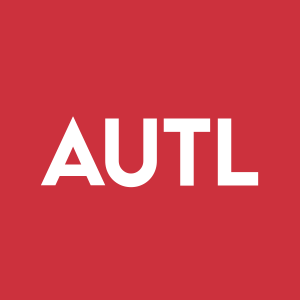Autolus Therapeutics presents longer-term follow-up and additional data analysis of Pivotal Phase 2 FELIX study of obe-cel for adult r/r B-ALL in an oral presentation at ASCO
Rhea-AI Summary
Autolus Therapeutics announced longer-term follow-up and additional data from the pivotal Phase 1b/2 FELIX study of obe-cel for relapsed/refractory (r/r) adult B-cell Acute Lymphoblastic Leukemia (ALL). Presented at ASCO 2024, the data revealed that 40% of patients remain in remission without further therapy, showing potential long-term survival benefits. Median overall survival (OS) was 23.8 months, and median event-free survival (EFS) was 11.9 months. The FDA BLA submission has a target action date of November 16, 2024. The results support obe-cel as a standalone therapy with CAR T persistence linked to improved outcomes.
Positive
- 40% of patients remain in remission without further therapy.
- Median overall survival (OS) of 23.8 months.
- Median event-free survival (EFS) of 11.9 months.
- FDA BLA submission target action date of November 16, 2024.
- CAR T persistence linked to improved event-free survival.
- Potential long-term plateau of survival outcomes.
- Data consistent with Phase 1 ALLCAR19 results.
Negative
- 36% of patients relapsed or died post-treatment.
- Overall, consolidative SCT did not improve EFS or OS.
- Patients with loss of CAR T persistence had a 2.7-fold increased risk of relapse or death.
- Patients who experienced B-cell recovery had a 1.7-fold increased risk of relapse or death.
News Market Reaction 1 Alert
On the day this news was published, AUTL gained 5.01%, reflecting a notable positive market reaction.
Data tracked by StockTitan Argus on the day of publication.
- The majority of patients that responded to obe-cel showed durable responses with the potential for a long-term plateau of survival outcomes
40% patients are in ongoing remission without subsequent stem cell transplant (SCT) or other intervention- Ongoing CAR T persistence was associated with improved event-free survival
- Autolus will host a conference call and webcast to discuss the presented data on Saturday June 1, 2024 at 9:30 am EDT/8:30 am CDT/2:30 pm BST (details below)
LONDON, May 31, 2024 (GLOBE NEWSWIRE) -- Autolus Therapeutics plc (Nasdaq: AUTL), a clinical-stage biopharmaceutical company developing next-generation programmed T cell therapies, today announces longer-term follow-up and additional data analysis from the pivotal Phase 1b/2 FELIX study of obecabtagene autoleucel (obe-cel) in relapsed/refractory (r/r) adult B-cell Acute Lymphoblastic Leukemia (ALL), being presented at the 2024 American Society of Clinical Oncology (ASCO) Annual Meeting, (May 31 – June 4, 2024, Chicago).
“At 21 months of median follow up, we’re really pleased to be observing the potential for a long-term plateau of survival outcomes with obe-cel in the FELIX trial,” said Dr. Christian Itin, Chief Executive Officer of Autolus. “
The results of the FELIX trial have been submitted to the FDA as part of a BLA. The PDUFA target action date is November 16, 2024.
ASCO Oral Presentation, abstract #6504:
Title: Obecabtagene autoleucel (obe-cel, AUTO1) in adults with relapsed/refractory B-cell acute lymphoblastic leukemia (R/R B-ALL): Overall survival (OS), event-free survival (EFS) and the potential impact of chimeric antigen receptor (CAR)-T cell persistency and the potential impact of chimeric antigen receptor (CAR)-T cell persistency and consolidative stem cell transplantation (SCT) in the open-label, single-arm FELIX Phase Ib/II study
Session Title: Oral Abstract Session – Hematologic Malignancies—Leukemia, Myelodysplastic Syndromes, and Allotransplant
Session date and time: Friday, May 31, 2024, 14:45 – 17:45 EDT, 19:45 – 22:45 BST
Presenting Author: Dr Elias Jabbour, Professor, Department of Leukemia, Division of Cancer Medicine, MD Anderson Cancer Center, Houston, TX
Summary:
The ORR (CR/CRi) in all patients who received obe-cel in the FELIX study was
18 of 99 responders (
CAR T persistence and B-cell aplasia were both associated with improved EFS compared with loss of persistency and B-cell recovery. Patients with loss of CAR T persistence had a 2.7 fold increased risk of relapse or death compared to patients with ongoing CAR T persistence. Patients who experienced B-cell recovery had a 1.7 fold increased risk of relapse or compared with patients without B-cell recovery. Among patients with CR/CRi beyond 6 months without SCT or new therapies, patients with ongoing CAR T persistence are associated with improved EFS vs. those with a loss of CAR T persistence.
In conclusion these data support the potential of a long-term plateau of survival outcomes in patients receiving obe-cel. At a median follow-up of 21.3 months
A conference call and webcast to discuss the presented data will be held at 9:30 am EDT/8:30 am CDT/2:30 pm BST on Saturday June 1, 2024. Conference call participants should pre-register using this link to receive the dial-in numbers and a personal PIN, which are required to access the conference call.
A simultaneous audio webcast and replay will be accessible on the events section of Autolus’ website.
About Autolus Therapeutics plc
Autolus is a clinical-stage biopharmaceutical company developing next-generation, programmed T cell therapies for the treatment of cancer and autoimmune disease. Using a broad suite of proprietary and modular T cell programming technologies, Autolus is engineering precisely targeted, controlled and highly active T cell therapies that are designed to better recognize target cells, break down their defense mechanisms and eliminate these cells. Autolus has a pipeline of product candidates in development for the treatment of hematological malignancies, solid tumors and autoimmune diseases. For more information, please visit www.autolus.com
About obe-cel (AUTO1)
Obe-cel is a CD19 CAR T cell investigational therapy designed to overcome the limitations in clinical activity and safety compared to current CD19 CAR T cell therapies. Obe-cel is designed with a fast target binding off-rate to minimize excessive activation of the programmed T cells. In clinical trials of obe-cel, this “fast off-rate” profile reduced toxicity and T cell exhaustion, resulting in improved persistence and leading to high levels of durable remissions in r/r Adult ALL patients. The results of the FELIX trial, a pivotal trial for adult ALL, have been submitted and accepted by the FDA with a PDUFA target action date of November 16, 2024. A regulatory submission to the EMA was made in the first half of 2024. In collaboration with Autolus’ academic partner, UCL, obe-cel is currently being evaluated in a Phase 1 clinical trials for B-NHL.
About obe-cel FELIX clinical trial
Autolus’ Phase 1b/2 clinical trial of obe-cel enrolled adult patients with relapsed / refractory B-precursor ALL. The trial had a Phase 1b component prior to proceeding to the single arm, Phase 2 clinical trial. The primary endpoint was overall response rate, and the secondary endpoints included duration of response, MRD negative CR rate and safety. The trial enrolled over 100 patients across 30 of the leading academic and non-academic centers in the United States, United Kingdom and Europe. [NCT04404660]
Forward-Looking Statements
This press release contains forward-looking statements within the meaning of the "safe harbor" provisions of the Private Securities Litigation Reform Act of 1995. Forward-looking statements are statements that are not historical facts, and in some cases can be identified by terms such as "may," "will," "could," "expects," "plans," "anticipates," and "believes." These statements include, but are not limited to, statements regarding Autolus’ development and commercialization of its product candidates, timing of data announcements and regulatory submissions, its cash resources and the market opportunity for obe-cel. Any forward-looking statements are based on management's current views and assumptions and involve risks and uncertainties that could cause actual results, performance, or events to differ materially from those expressed or implied in such statements. These risks and uncertainties include, but are not limited to, the risks that Autolus’ preclinical or clinical programs do not advance or result in approved products on a timely or cost effective basis or at all; the results of early clinical trials are not always being predictive of future results; the cost, timing and results of clinical trials; that many product candidates do not become approved drugs on a timely or cost effective basis or at all; the ability to enroll patients in clinical trials; and possible safety and efficacy concerns. For a discussion of other risks and uncertainties, and other important factors, any of which could cause Autolus’ actual results to differ from those contained in the forward-looking statements, see the section titled "Risk Factors" in Autolus' Annual Report on Form 10-K filed with the Securities and Exchange Commission, or the SEC, on March 21, 2024 as well as discussions of potential risks, uncertainties, and other important factors in Autolus' subsequent filings with the Securities and Exchange Commission. All information in this press release is as of the date of the release, and Autolus undertakes no obligation to publicly update any forward-looking statement, whether as a result of new information, future events, or otherwise, except as required by law. You should, therefore, not rely on these forward-looking statements as representing Autolus’ views as of any date subsequent to the date of this press release.
Contact:
Olivia Manser
+44 (0) 7780 471 568
o.manser@autolus.com
Julia Wilson
+44 (0) 7818 430877
j.wilson@autolus.com
Susan A. Noonan
S.A. Noonan Communications
+1-917-513-5303
susan@sanoonan.com








